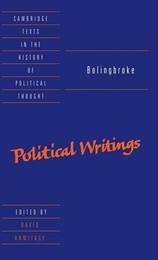
|
Bolingbroke: Political Writings
Hardback
Main Details
| Title |
Bolingbroke: Political Writings
|
| Authors and Contributors |
By (author) Henry Bolingbroke
|
|
Edited by David Armitage
|
| Series | Cambridge Texts in the History of Political Thought |
|---|
| Physical Properties |
| Format:Hardback | | Pages:354 | | Dimensions(mm): Height 216,Width 140 |
|
| ISBN/Barcode |
9780521443937
|
| Classifications | Dewey:320.01 |
|---|
| Audience | | Professional & Vocational | |
|---|
|
Publishing Details |
| Publisher |
Cambridge University Press
|
| Imprint |
Cambridge University Press
|
| Publication Date |
11 September 1997 |
| Publication Country |
United Kingdom
|
Description
Henry St John, Viscount Bolingbroke, was one of the most creative political thinkers in eighteenth-century Britain. In this volume, modernised and fully annotated texts of his most important political works, the Dissertation upon Parties, the letter, 'On the Spirit of Patriotism', and The Idea of the Patriot King, are brought together for the first time. Bolingbroke was the first major thinker to face the long-term economic and political consequences of the Glorious Revolution, particularly the creation of the first modern system of party politics. In these works he attempted to forge an ideology of opposition to attack the Whig oligarchy of Sir Robert Walpole. His analyses of constitutional government and the party system are still relevant to the dilemmas of modern democratic politics, as are his recommendations for a patriotic commitment to the common good and the necessity of a non-partisan executive.
Reviews'Armitage's edition of Bolingbroke's political writings of the 1730s will be an essential help for all students of the history of ideas ... The editorial quality of the volume, taken together with a comprehensive annotated bibliography and extensive bibliographical data on Viscount Bolingbroke, make sure that David Armitage's edition of Bolingbroke's political writings is a major achievement for CUP's Cambridge Texts in the History of Political Thought.' History
|